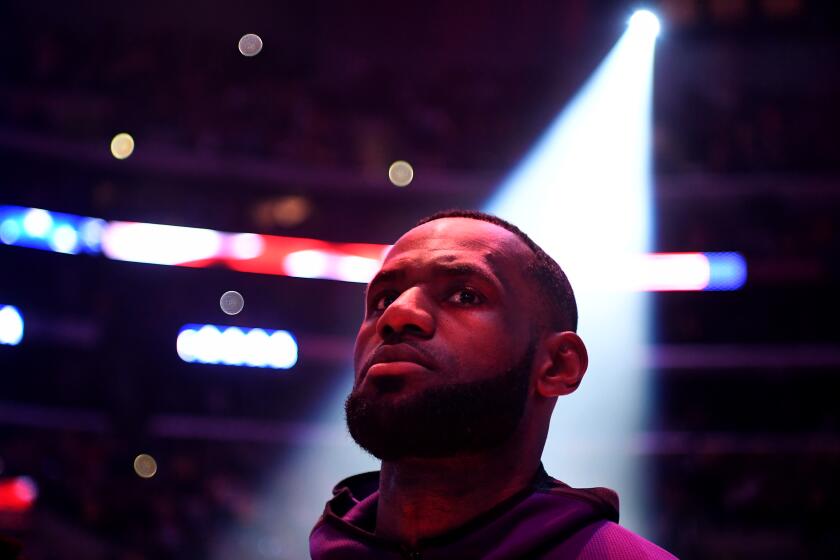Misconceptions About Dyslexia Haunt Nelson
- Share via
YUMA, Ariz. — Rob Nelson, a first-base prospect for the Padres, had just enlivened an intrasquad game by powering a ball about 425 feet over the right-field fence and into a parking lot.
“Did you get all of it?” someone jokingly asked him after he had crossed home plate.
“If you saw it come down, then I didn’t get all of it,” he said with a shrug.
Such has been the attitude this former South Pasadena High School star has taken toward a six-year pro career that has yet to stop in the big leagues for more than a couple of hours at a time. Nelson has learned that for him to be given a steady chance, he must prove himself beyond all doubt.
Nelson has dyslexia, a reading disorder. He sometimes sees the letters reversed, sometimes misses letters and words entirely. He does not read books because the process is so painstaking and frustrating. But he does read magazines and newspapers.
“And I can read a lineup card,” Nelson said. “In this game, isn’t that enough?”
He wonders if baseball people believe that.
He says he was denied an appropriate signing bonus while he was at Mt. San Antonio College.
“An Atlanta Braves scout told me that because I had dyslexia, I could never get the kind of money I wanted,” he said.
He then signed with Oakland. After hitting home runs in double figures in the minor leagues for four consecutive seasons, he opened the 1987 season as the A’s starting first baseman. But he lasted just seven games. With a .167 average, he was replaced by Mark McGwire, sent to triple-A Tacoma and later was traded to the Padres.
Said Karl Kuehl, A’s director of player development: “We feel his disability had nothing to do with his baseball ability, but we knew we had to treat Robbie a little differently.”
Last year, for the Padres’ triple-A Las Vegas farm team, Nelson hit 23 homers with 77 RBIs, but he made the major leagues for just seven more games and struggled again with a .190 average.
This winter in contract negotiations, Tom Romenesko, Padre farm director, brought up the disability again.
“We feel dyslexia affects him like another player is affected by a muscle pull or sore finger,” Romenesko said. “We believe it’s an eye muscle problem that can affect his swing. If you look at his scouting reports, there is a certain pitch he can’t hit, and we wonder if it’s because he can’t properly track the ball as it comes from the pitcher.
“If he works on it, it’s no big deal, just like the guy with the pulled muscle. He is a major league caliber player who will probably play a lot of years in the big leagues. We are very high on him. He just has to keep working on his problem.”
Nelson and experts from the Hillside Development and Learning Center in La Canada--where he was tutored as a youngster--strongly disagree with that assessment. It’s not that they believe Nelson doesn’t need to keep working on his hitting. They simply say dyslexia has nothing to do with hitting.
“That is absolutely ludicrous,” said Bob Dannenhold, executive director of the Hillside Center. “That is dangerous talk. Rob had problems reading, but reading is a language process while baseball is a motor skill. And Rob was always a whiz at motor skills.
“And Rob’s reading problems have nothing to do with his eyes. You don’t read with your eyes, you read with your brain.”
Nelson, 24, understands, though, that he is the club’s fourth first baseman, behind Jack Clark, Carmelo Martinez and John Kruk. He understands that he will probably return to triple-A, though he has survived three cuts and is currently among three players vying for the two remaining utility spots on the team.
And he knows that in this instance, it has nothing to do with what anybody thinks about his ability to read.
He also understands that, even though he has hit .313 this spring with three home runs, he needs work. In 65 big league at-bats, he has 11 hits--a .169 average. He has struck out 33 times, and has walked just four times.
“But it’s not because I see the ball backward or anything,” he said. “I don’t see the rotation wrong. It’s not like a slider looks like a screwball.”
Otherwise quiet and subdued, Nelson’s voice rises and his face reddens when he talks about what Dannenhold calls, “The curse of being labeled.”
Nelson said: “If teams are holding being dyslexic against me, then why am I even here? Why am I even trying? If anybody would ever ask me about this--and they never really have--I would love to sit down and honestly tell them just what it’s like.”
Start in the seventh grade, when Nelson’s teacher phoned his parents to discuss his poor grades. He was taken to Hillside for testing, where he and his family first heard the word dyslexia.
“We didn’t understand it,” recalled his father, David.
Nelson was sent to Hillside for tutoring twice a week. And his father added another brand of therapy.
“I would bring him the morning sports section and get him to read it,” David Nelson said. “I would ask him what happened that day, talk about what he read. It got so, if he took his time, he was having no problems with it.”
Experts say that often, dyslexics have a fear of failure. The Nelsons combated this with baseball. Rob began spending the majority of his time on fields, moving up through youth baseball and on to the South Pasadena High varsity as a sophomore.
“As soon as a person is labeled as dysfunctional, sometimes he loses his self-confidence, he becomes afraid to risk anything in social situations,” said Jeff Spencer, Nelson’s tutor at Hillside and an Olympic cyclist in 1972. “That’s why sports was so good for Rob. It was different. He could compete there. There is no telling what toll this labeling would have had on him if he had not been so good in sports.”
Nelson said: “It’s what I tell people today. If anything, my dyslexia is an advantage in baseball because all my life I’ve had to learn verbally and through what I see. I’m a great listener and watcher. And that’s how you learn in baseball.”
As he realized that school would always be painful for him, he attached himself increasingly to baseball, where with his bat and glove, he was the fast learner.
During his senior year of high school, a season that was good enough to get him drafted by Houston, he applied to UCLA.
He was so excited that he drove over and handed his application to the athletic department himself.
He never heard from the school, but five years later, in 1987, a UCLA athletic official he won’t identify saw him playing with the Padres in Dodger Stadium.
“This guy walked up to a friend of mine and said, ‘Oh look, there’s Rob Nelson, I’m so glad he overcame his learning disability,’ ” Nelson said. “Man, did that burn me.”
After graduating from high school in 1982, he enrolled at Mt. San Antonio College. But six months later, he felt burned again by what he thought was a misconception.
He was taken in the first round of the secondary phase of the January, 1983, draft by Atlanta. Soon thereafter, the Braves’ scout walked into the Nelsons’ living room and offered a $25,000 bonus, about $30,000 less than Nelson’s opening demand. Then, according to Nelson, the scout said there would be no negotiations.
“He told me I wouldn’t get any more than that because of my dyslexia,” Nelson said.
That might have worked if the scout had just been speaking to a then-impressionable youngster. But Nelson’s mother, Jacquie, was also there.
“She jumped all over him,” Nelson recalled. “Told him he had not done his homework, that he did not know what he was talking about. The guy left in a huff and said I would never get another chance.”
Nelson hit 17 homers in 35 games for the junior college that spring and ensured that he would get another chance, this time with Oakland. The A’s, according to Kuehl, understood.
“We realized we had to verbalize things more with him,” the A’s farm director said. “We had to check and make sure he understood things. With him, in teaching, we always took his disability into consideration.”
And not once, Kuehl said, did they look at it as a baseball ailment.
Said Nelson: “Funny, but I never even knew the A’s knew about my dyslexia.”
But little triumphs keep Nelson swinging, harder still, hoping not to end his career until he can hear people say, “That Rob Nelson, he got all of it.”
Said Nelson: “If dyslexia had this much effect on me, I wouldn’t be where I am, would I? There’s a difference between a chance and a fair chance. All I want is a fair chance.”
More to Read
Go beyond the scoreboard
Get the latest on L.A.'s teams in the daily Sports Report newsletter.
You may occasionally receive promotional content from the Los Angeles Times.











